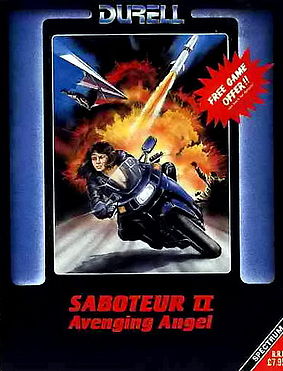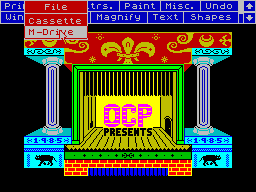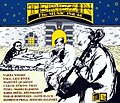
The Amstrad CPC is a series of 8-bit home computers produced by Amstrad between 1984 and 1990. It was designed to compete in the mid-1980s home computer market dominated by the Commodore 64 and the ZX Spectrum, where it successfully established itself primarily in the United Kingdom, France, Spain, and the German-speaking parts of Europe.

The ZX Spectrum is an 8-bit home computer that was developed by Sinclair Research. It was released in the United Kingdom on 23 April 1982, and became Britain's best-selling microcomputer.
Amstrad was a British electronics company, founded in 1968 by Alan Sugar at the age of 21. The name is a contraction of Alan Michael Sugar Trading. It was first listed on the London Stock Exchange in April 1980. During the late 1980s, Amstrad had a substantial share of the PC market in the UK. Amstrad was once a FTSE 100 Index constituent, but since 2007 has been wholly owned by Sky UK. As of 2006, Amstrad's main business was manufacturing Sky UK interactive boxes. In 2010, Sky integrated Amstrad's satellite division as part of Sky so they could make their own set-top boxes in-house.
The Multiface was a hardware peripheral released by Romantic Robot for several 1980s home computers. The primary function of the device was to dump the computer's memory to external storage. Pressing a red button on the Multiface activated it. As most games of the era did not have a save game feature, the Multiface allowed players to save their position by saving a loadable snapshot of the game. Home computer software of the early 1980s was typically loaded into RAM in one go, with copy protection measures concentrating the loading phase or just after it. The snapshot feature could be used after copy protection routines had been executed, to create a backup that was effectively unprotected against unauthorised distribution. Later models of the Multiface mitigated this by requiring the device to be present when re-loading the dumps into memory, making the dumps useless to people without a Multiface. Software producers also reacted to the threat by using routines that would prevent execution of the product if it detected that a Multiface was present and by loading the software in multiple parts, thus requiring the presence of the original, copy-protected media.

The SAM Coupé is an 8-bit British home computer that was first released in late 1989. It was based on and designed to have compatibility with the ZX Spectrum 48K and marketed as a logical upgrade from the Spectrum. It was originally manufactured by Miles Gordon Technology (MGT), based in Swansea in the United Kingdom.
Sinclair Research Ltd is a British consumer electronics company founded by Clive Sinclair in Cambridge. It was originally incorporated in 1973 as Westminster Mail Order Ltd, renamed Sinclair Instrument Ltd, then Science of Cambridge Ltd, then Sinclair Computers Ltd, and finally Sinclair Research Ltd. It remained dormant until 1976, when it was activated with the intention of continuing Sinclair's commercial work from his earlier company Sinclair Radionics, and adopted the name Sinclair Research in 1981.

Ghostbusters is a licensed game by Activision based on the film of the same name. It was designed by David Crane and released for several home computer platforms in 1984, and later for video game console systems, including the Atari 2600, Master System and Nintendo Entertainment System. The primary target was the Commodore 64 and the programmer for the initial version of the game was Adam Bellin. All versions of the game were released in the USA except for the Amstrad CPC and ZX Spectrum versions, which were released only in Europe, and the MSX version, which was released only in Europe, South America, and Japan.
Odin Computer Graphics were a Liverpool-based computer games developer who came to prominence in the mid-1980s with a variety of titles for the ZX Spectrum, Commodore 64 and Amstrad CPC home computers.
In computing, a non-maskable interrupt (NMI) is a hardware interrupt that standard interrupt-masking techniques in the system cannot ignore. It typically occurs to signal attention for non-recoverable hardware errors. Some NMIs may be masked, but only by using proprietary methods specific to the particular NMI.

CRL Group plc is a defunct British video game development and publishing company. Originally CRL stood for "Computer Rentals Limited". It was based in King's Yard, London and run by Clem Chambers.

Kikstart 2 is a motorcycle trials racing videogame released for the Amiga, Amstrad CPC, Commodore 64 and ZX Spectrum. It enjoyed more success than its predecessor, Kikstart. The game allowed 2-player simultaneous or 1-player, vs-computer play.
Crystal Computing, later renamed Design Design, was a British video game developer founded in 1982 by Chris Clarke and Ian Stamp while students at the University of Manchester. Graham Stafford, Neil Mottershead, Simon Brattel and Martin Horsley, joined the company as it expanded. The company's first software release was a compilation of games for the Sinclair ZX81, though it was with the ZX Spectrum that Crystal found its greatest success. A deal with the machine's manufacturer Sinclair to distribute Crystal's Zeus Assembler gave the company sufficient funds for a major marketing campaign for their next product, Halls of the Things, an arcade adventure game that became their most successful title.
The ZX Spectrum's software library was very diverse. While the majority of the software produced for the system was video games, others included programming language implementations, Sinclair BASIC extensions, databases, word processors, spread sheets, drawing and painting tools, and 3D modelling tools.
DK'Tronics Ltd was a British software and hardware company active during the 1980s. It primarily made peripherals for the ZX Spectrum and Amstrad CPC but also released video games for the ZX81, ZX Spectrum, Commodore 64, VIC-20, BBC Micro, Memotech MTX, MSX and Amstrad platforms.
Tasword was a word processor for the ZX Spectrum developed by Tasman Software. The first version was released in 1982 and spawned two major revisions in addition to several add-ons and, later, tailored versions for the +2 and +3 Spectrum models, the SAM Coupé, the MSX, the Timex Sinclair 2068 and the Amstrad CPC range.

Saboteur II: Avenging Angel, also known as Saboteur 2, is an action-adventure game created by Clive Townsend and released by Durell Software in 1987 for the ZX Spectrum, Amstrad CPC, Commodore 64, and MS-DOS compatible operating systmes. A sequel to 1985's Saboteur, the player controls a sister of Ninja from the first game on a mission to avenge his death. Saboteur II was one of the first action-adventure games with a female protagonist and was well received by critics.

Wriggler is a Spectrum and Amstrad maze game published in 1985 by Romantic Robot. The original release of Wriggler contained an instrumental track on the B-side titled "Moons of Jupiter," composed by Alexander Goldscheider.

Alexander Goldscheider is a Czech-born British composer, music producer, writer and computer specialist.

OCP Art Studio or Art Studio was a popular bitmap graphics editor released in 1985, created by Oxford Computer Publishing and written by James Hutchby.





















